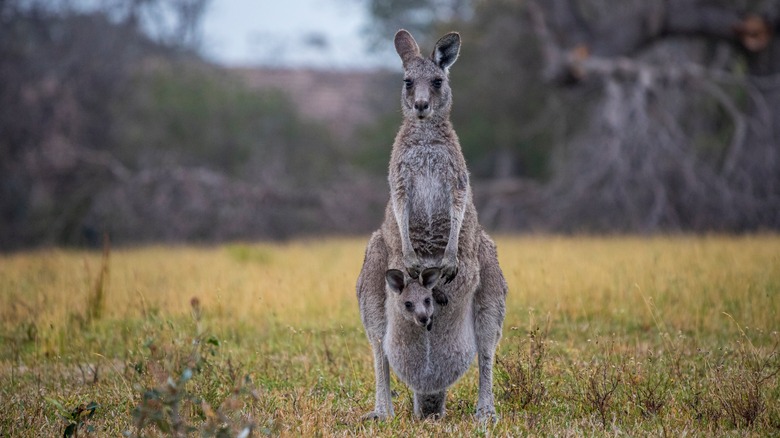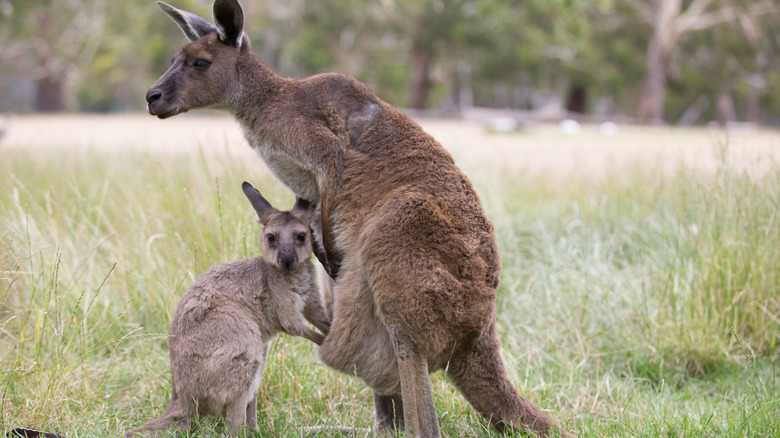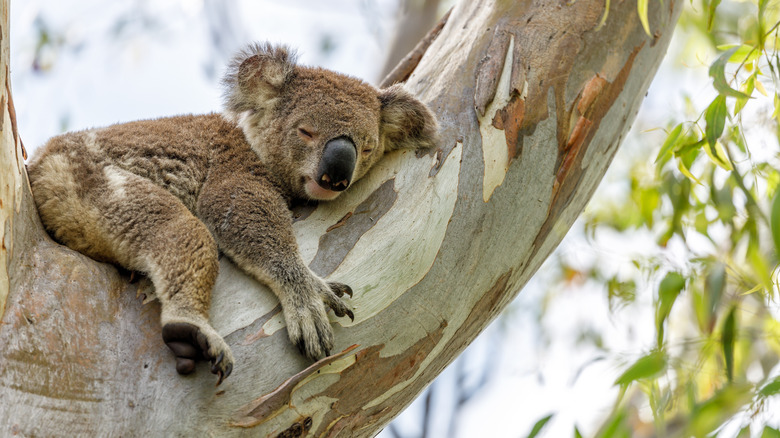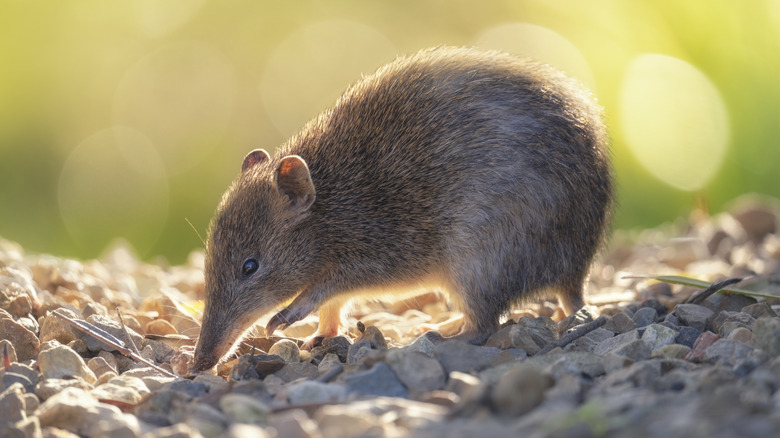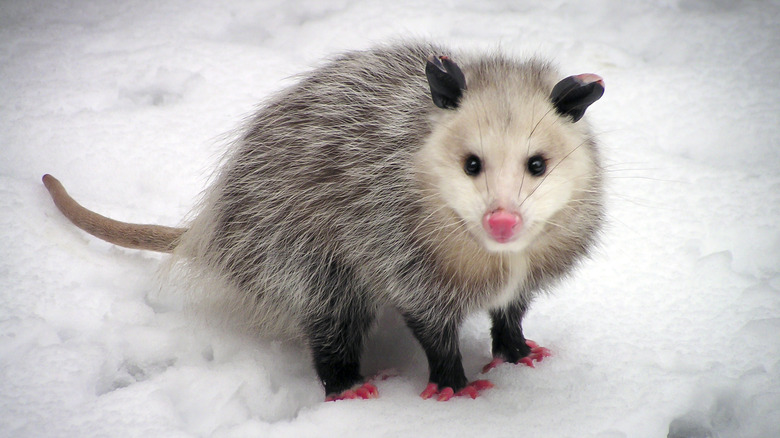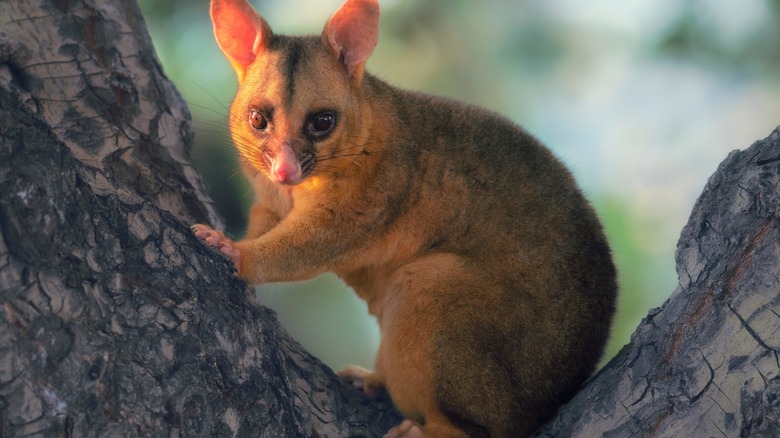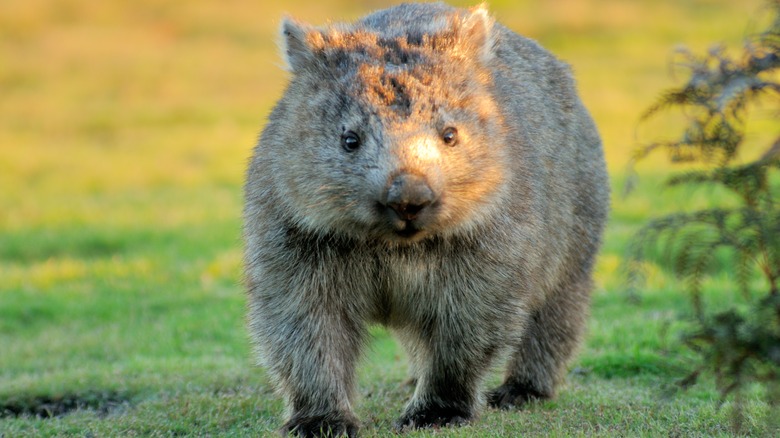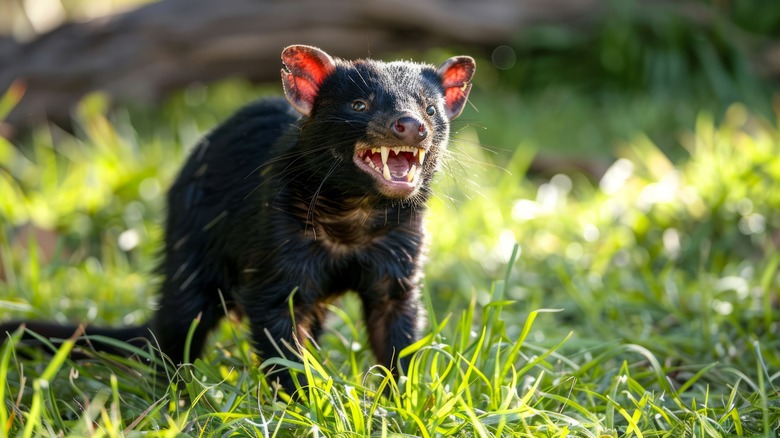What Is A List Of Mammals With Pouches?
The sight of a baby kangaroo popping its head out of its mother's pouch is one of the cutest scenes in nature. It's also the most iconic example of one of nature's most fascinating reproductive methods. Kangaroos are mammals, just like us, but they belong to a unique mammalian infraclass called Metatheria, better known as marsupials. Although marsupials are commonly referred to as "pouched mammals," and the word even comes from the Latin "marsupium," which means pouch, some species, like the shrew opossum and phascogale, don't have pouches, or only have small flaps that half resemble pouches.
The marsupial reproduction begins the same as other mammals, but they give birth very prematurely, sometimes just over a week after conception. In most mammals, the offspring fully develops inside the uterus, receiving nutrients from its mother via the umbilical cord and placenta. Marsupials, however, don't have umbilical cords and only have a frail placenta that lasts just a few days. During the premature birth, marsupial offspring crawl from the birth canal into their mother's pouch and latch onto a nipple for nutrients. They remain there until they have finished developing.
Roughly two-thirds of all marsupial species are native to Australia. Kangaroos and koalas are probably the most famous among them, but marsupials are far more diverse than that. There are currently 335 known species of marsupial in the world, far too many to cover in a single article, but there are few families within this group that particularly stand out.
Kangaroos
Kangaroos are probably the first thing that comes to mind when you think of pouched animals. There are four species of kangaroo: the red kangaroo (Osphranter rufus), eastern grey kangaroo (Macropus giganteus), western grey kangaroo (Macropus fuliginosus), and antilopine kangaroo (Osphranter antilopinus). All four are endemic to Australia, which is the only place where they are found in the wild. There, kangaroos live throughout much of the country's arid interior, feeding on grasses and foliage. Their plant-based diet provides them with the water they need to survive in a notoriously dry landscape.
The red kangaroo is the largest pouched mammal species on Earth. Males can top 6 and a half feet in height and weight up to 200 pounds. They are athletic freaks, reaching speeds up to 35 miles per hour. Famous for their jumping abilities, kangaroos can cover 25 feet in a single leap with a 6-foot vertical that puts the greatest NBA dunkers to shame. They are immensely strong, and males will sometimes fight over mates by doing battle with their powerful legs.
Kangaroo offspring are just an inch long at birth. This is the most vulnerable stage of the kangaroo life cycle, as the joey isn't even strong enough to suck milk. Instead, its mother must use her own muscles to pump milk into her newborn. After two months, the joey can finally leave its mother's pouch, although it will continue to return to the pouch for safety up until eight months old.
Koalas
Although often referred to as the "koala bear," koalas are not bears at all. However, their teddy-bear-like appearance is the basis for their scientific name, Phascolarctos cinereus, which comes from Greek words meaning "pouched bear". Koalas are native to the forests of eastern and southeastern Australia, where they feed mainly on eucalyptus leaves. Unfortunately for koalas, eucalyptus has toxins in it that need to be filtered out by the animal's digestive system, leaving very little in the way of actual nutrients behind. A single koala can eat over a pound of eucalyptus leaves each day, yet they receive so little energy from it that they need to sleep 18 to 22 hours. Their lives are almost exclusively spent sleeping and eating.
Koala joeys are born around a month after conception, at which point they weigh just 1 gram. In the pouch, they grow rapidly, increasing 10 times in size within their first three months. After six months, the joeys leave the pouch, but they spend the next six months being carried on their mothers' backs. Living high in the trees, gravity poses a challenge to koala reproduction. To keep the joey from falling out, the mother koala has to consciously use her muscles to keep her pouch closed, something kangaroos don't have to bother with.
Koalas are the only surviving species in their taxonomic family, but their numbers have been dwindling. Deforestation, disease, and increasingly common wildfires have dramatically reduced their populations to the point that some conservationists have argued that koalas are functionally extinct.
Bandicoots
Bandicoots are a group of rodent-like marsupials that comprise the taxonomic order Peramelemorphia. There are more than 20 known species of bandicoot, spread across Australia, Tasmania, New Guinea, and a few of their neighboring islands. Bandicoots look a bit like large rats, ranging from about 1 to 3 feet in length, counting their long tails. Their name, taken from the Telugu words "pandi kokku," even translates to "pig rat". Much like pigs do, bandicoots use their snouts to root around for food in the dirt, leaving behind little holes in the ground known as snout pokes.
Bandicoots are omnivores with a very diverse diet. They eat spiders, insects, and larvae, but will also seek out larger meats like snails, lizards, and even mice. For the plant-based portion of their diet, bandicoots eat fruits, berries, seeds, roots, and fungi. Observers have noted that bandicoots tend to make an excited grunting sound when they smell food.
Unlike kangaroos and koalas, which tend to have one offspring at a time as humans do, bandicoots give birth in litters of two to six joeys. The bandicoot has the shortest gestation period of any marsupial, averaging just 11 days between conception and birth. The joeys are just half an inch long at birth, and take three months before they can leave their mother's pouch. Since bandicoots do a lot of digging for their food, the mother's pouch actually points backward in order to keep dirt from getting into it.
Opossums
The only marsupials native to the Americas are the opossums, comprising the taxonomic order Didelphimorphia. There are over 100 species of opossum found in South and Central America, but there is only one species found in North America: the Virginia opossum (Didelphis virginiana). They can be found throughout most of the United States, except for the Rocky Mountain region. Opossums inhabit a wide range of environments, with Virginia opossums living in forests, marshes, farmland, and urban areas. They are omnivorous scavengers, and as animals with good night vision, they hunt nocturnally. Some people see opossums as pests because they dig through trash, but they are really pest exterminators. Opossums love to eat rats, mice, cockroaches, and ticks, and they are actually incredibly clean animals who regularly groom themselves like cats.
Opossums are famous for playing dead when they are threatened. They collapse onto their side, their tongue lolling out and their eyes either closed or frozen unblinkingly. At the same time, they release fluid from their anus that makes them smell like dead flesh. This response is completely involuntary, and the opossum can be stuck in its frozen state for up to six hours.
There are typically six or seven joeys in each opossum litter, but there can be as many as 25. Since female opossums have thirteen teats, they can only nourish 13 joeys in their pouch at once, and any over that number will starve. Joeys leave the pouch after about two months, and spend the next four to six weeks riding on their mother's back.
Possums
Americans often refer to opossums as "possums," but technically, that term refers to an entirely different group of marsupials in the order Diprotodontia, which is the same order that kangaroos and koalas belong to. There are numerous subfamilies of possum, including the honey possums, ringtailed possums, and pygmy possums, but the most well known of all is the aptly named common brushtail possum (Trichosurus vulpecula). Characterized by their bushy tails, which they can use to grip tree branches, common brushtail possums are Australia's most widespread marsupial, more abundant than the kangaroo. Like the Virginia Opossum, it has adapted to urban living, becoming a common sight in people's yards.
In the Australian states of Queensland, New South Wales, Victoria, and Tasmania, residents often encounter eastern ringtail possums (Pseudocheirus peregrinus). This species displays a particularly unique behavior, being the only possum species in which the males help to raise the joeys. After a gestation period of about 20 days, the mother will give birth to one or two bean-sized joeys, which spend the next seven weeks in her pouch, feeding on her milk. After that, the joeys emerge and spend the next six months of their lives riding on their mother's back. That is, unless the mother needs to eat, in which case, the father takes over the piggy-back rides. While other species are quite solitary, ringtail possums live in family nests called dreys, which they usually make out of hollows in tree trunks.
Wombats
Wombats are burrowing marsupials that comprise the taxonomic family Vombatidae. In appearance, they resemble massive groundhogs, averaging around 3 feet in length and topping 50 pounds in weight. This makes them the world's largest burrowing animals. Modern wombats are also related to the largest marsupial that ever existed, the now-extinct giant wombat (Diprotodon).
There are three species of wombat, all found in Australia. The most widespread species is the common wombat (Vombatus ursinus). It has many other names, including the island wombat, forest wombat, Tasmanian wombat, naked-nosed wombat, and bare-nosed wombat. These latter two names refer to the species' most defining feature: its large, hairless nose. They live in temperate forests, mainly around Tasmania and southeastern Australia. The remaining two wombat species — the southern hairy-nosed wombat (Lasiorhinus latifrons) and northern hairy-nosed wombat (Lasiorhinus barnardi) — are less common, with the northern being considered a critically endangered species. There were at least two other species of hairy-nosed wombats until around a century ago, when both went extinct.
Wombats carry their joeys in pouches that face backwards to prevent dirt infiltrating them when the burrowing animal gets to digging. Wombats have an unusual trait amongst marsupials in that they have two incisors in their upper jaw, which grow continuously throughout the animal's life. This ensures that their teeth never get worn down by their tough, high-fiber diet. They also keep their teeth in check by gnawing on bark. One odd fact about wombats is that their long digestive tracts produce square poop.
Tasmanian Devils
The real Tasmanian devil can't spin into a tornado and bust through a wall, but the famous "Looney Tunes" character does reflect its real life counterpart's ornery disposition and voracious appetite. Tasmanian devils (Sarcophilus harrisii) are the largest carnivorous marsupial species, weighing up to 26 pounds. They eat practically any form of meat they can find, leaving no trace behind as they consume the flesh, organs, hair, and bones of their prey using the strongest bite force per body mass of any mammal on Earth. They also eat carrion, and will even sleep inside animal carcasses.
Tasmanian devils are known for having extremely short tempers. When threatened by predators or competing for mates, they go berzerk, snarling, gnashing their teeth, and emitting the hellish screams for which early European colonizers gave them their name. They live exclusively in Australia's island state of Tasmania, where they are the apex carnivore. However, Tasmanian devils are currently facing a major threat in the form of an aggressive cancer exclusive to the species. Devil Facial Tumor Disease (DFTD) can be spread when Tasmanian Devils bite each other. It is 100% fatal, and there is no known cure.
Pregnancy in Tasmanian devils lasts around 20 days, after which the mother gives birth to a litter of 50 offspring. However, female Tasmanian devils only have four nipples available for their babies to latch onto, meaning the vast majority of every litter staves. The survivors leave the pouch after six months, and are fully independent by nine months of age.
